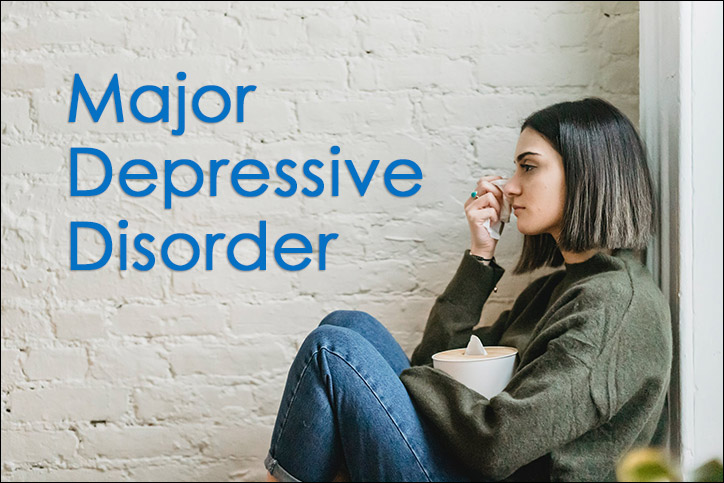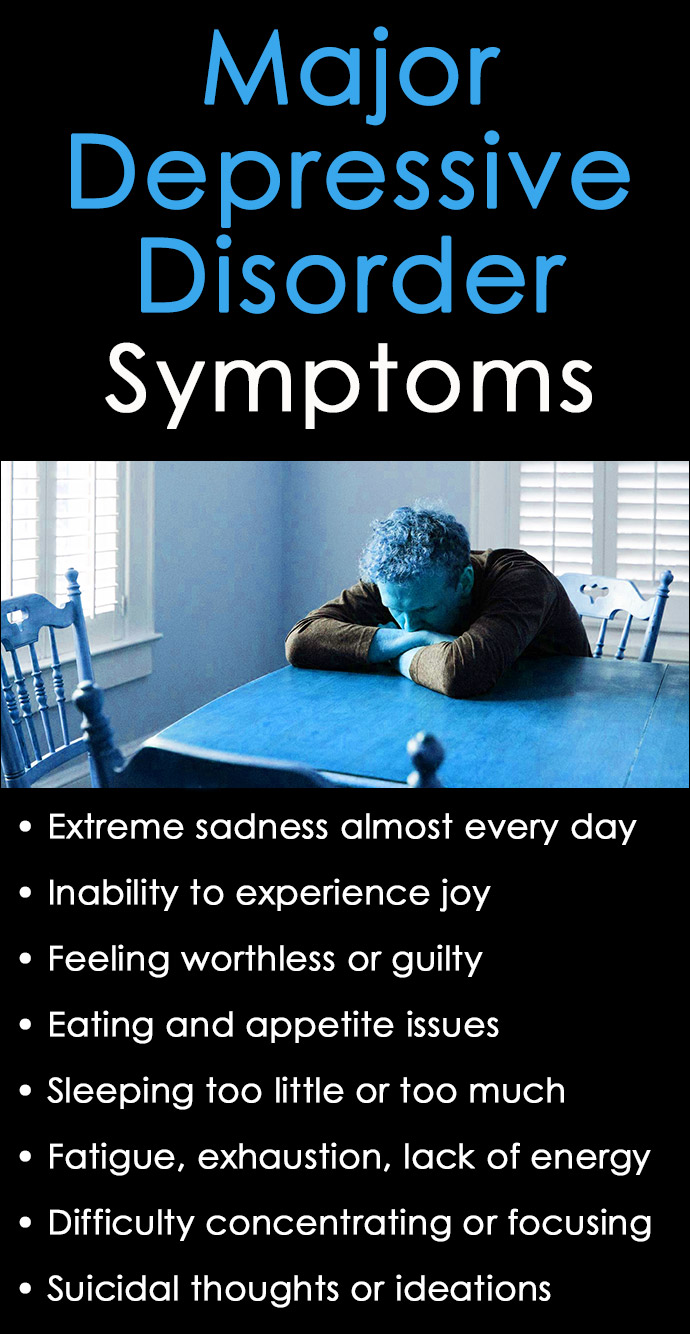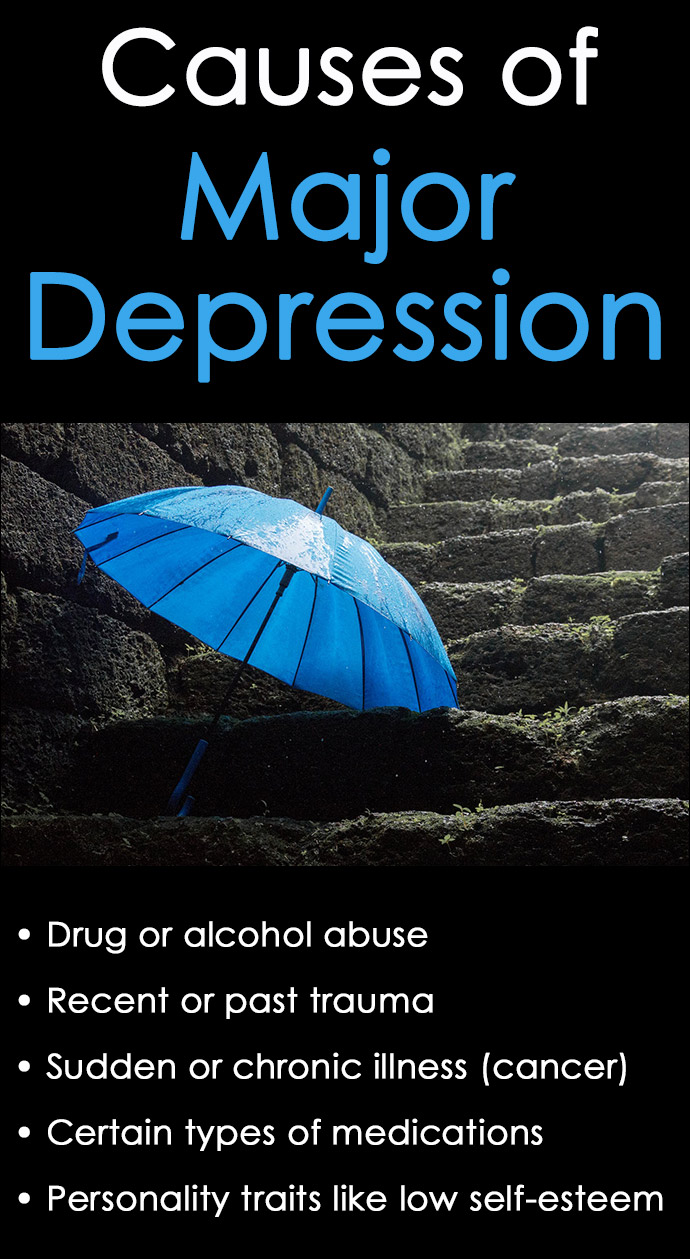Table of Contents
Major Depressive Disorder (MDD), also known as unipolar, major, or clinical depression, is a mood disorder that can have a serious impact on a person’s mental and emotional wellbeing.
Feeling sad or blue from time to time is completely normal and not something to worry about for most people. However, when these feelings persist or interfere with daily life, an underlying mental health condition could be to blame.
There are several different types of depression disorders that all have overlapping similarities, although major depressive disorder is the one most people refer to when thinking about depression.
Understanding major depressive disorder symptoms, causes, and treatments can help people seek help as soon as possible before the condition becomes more difficult to manage and leads to problems with daily living.
Creating awareness about this condition can also be helpful for those who don’t struggle with depression to have a better understanding and compassion for those affected by it.
What is Major Depressive Disorder (MDD)?
Major depressive disorder is a condition that affects an estimated 21 million adults each year in the United States and many more worldwide.
In 2020, nearly 8.4 percent of the U.S. population experienced at least one episode of major depressive disorder symptoms, according to the National Institute of Mental Health.
Major depression is usually recognized as a period of at least two weeks where a person experiences a majority of the symptoms.
MDD symptoms may include a depressed mood, problems sleeping, a loss of interest or pleasure in activities once enjoyed, and others listed below.
The onset of major depressive disorder symptoms generally leads to a significant impact on a person’s mood, physical energy, overall mental health, and ability to carry out routine responsibilities.
Recognizing the symptoms of MDD when they first appear can help a person seek help as soon as possible and begin some simple self care ideas to reduce the intensity and duration of the condition.
Major Depressive Disorder Symptoms
While major depressive disorder symptoms will vary for each individual, the Diagnostic and Statistical Manual of Mental Health Disorders (DSM 5), considered the “bible of psychiatric disorders,” requires that five or more symptoms be present for a period of two weeks or more for diagnosis.
Major Depressive Disorder Symptoms can include:
- Extreme sadness or irritability for most of the day, almost every day
- Restlessness and the inability to experience joy from activities, friends, or loved ones normally cherished and enjoyed
- Feelings of worthlessness, guilt, or shame
- Ruminating or obsessively worrying about the past
- Changes in appetite and eating that are associated with sudden weight gain or weight loss
- Experiencing sleep issues, such as sleeping too little or too much
- Fatigue, exhaustion, or an overall lack of physical energy
- Difficulty concentrating, focusing, or making decisions
- Suicidal thoughts or ideations
In some cases, loved ones may notice that a person battling with depression will isolate themselves from others.
People dealing with major depression symptoms may find they are drinking alcohol more frequently, or using marijuana and other substances as a way to self-medicate and cope with the symptoms.
This can lead to a substance use disorder that eventually makes the depressive symptoms worse over time.
Causes of Major Depressive Disorder Symptoms
Research has shown that factors such as stress, brain chemistry, hormone imbalance, and a family history of mental illness can lead to major depressive disorder symptoms in many people.
However, the exact cause of major depression is not totally understood.
There are other risk factors, though, that may increase the likelihood of MDD.
Common risk factors and causes of major depressive disorder symptoms can include:
- Drug and alcohol abuse
- Recent or past trauma, such as physical or sexual abuse, the loss of a loved one, a toxic relationship, or even serious financial troubles
- Sudden or chronic illness, such as cancer, a stroke, or heart disease
- Certain medications, like some high blood pressure prescriptions, sleeping pills, or steroids
- Personality traits like low self-esteem, being overly dependent on others, extreme pessimism, or highly self-critical
Whatever the underlying cause of major depression, it’s important to know that it is a treatable condition.
Major Depressive Disorder Treatments
The most effective major depressive disorder treatments usually include a combination of counseling and medications, as well as lifestyle changes.
Counseling and Psychotherapy
One-on-one counseling and psychotherapy is often the first approach to identify the causes of major depressive disorder symptoms and to create a successful treatment plan that may require medications.
Psychotherapy will include talk therapy and implement evidence-based therapies for depression such as Cognitive Behavioral Therapy (CBT) or Dialectical Behavior Therapy (DBT), among others.
Antidepressant Medications
While counseling and psychotherapy can be successful for treating major depression on their own, many times they are more successful when combined with antidepressant medications that help regulate and increase serotonin and other neurotransmitters to reduce symptoms and improve mood.
Medications used for major depression include:
- Selective Serotonin Reuptake Inhibitors (SSRIs) – Lexapro, Zoloft, Prozac, Celexa, and Paxil
- Serotonin-Norepinephrine Reuptake Inhibitors (SNRIs) – Cymbalta, Effexor, and Pristiq
- Serotonin Modulators – Trazodone, Nefazodone, and Vilazodone
- Tricyclic Antidepressants (TCAs) – Norpramin and Tofranil
- Monoamine Oxidase Inhibitors (MAOIs) – Nardil, Marplan, and Emsam
- Atypical Antidepressants, Antipsychotics, and Mood Stabilizers
Lifestyle Changes
Lifestyle changes can be more helpful than many people realize for reducing major depressive disorder symptoms and promoting better mental health.
Exercising regularly, eating healthy foods, and getting adequate sleep each night are considered the three pillars of health and have a positive impact on both physical and mental health.
All three of these have shown to decrease stress and boost the production of neurotransmitters that enhance mood and the way we feel.
It is also recommended to avoid using drugs or alcohol because they are known to increase many depressive symptoms.
TMS Therapy (Transcranial Magnetic Stimulation)
TMS Therapy stands for Transcranial Magnetic Stimulation, which is a treatment approach that has shown to be effective for people who failed to find relief for major depressive disorder symptoms when using traditional methods like antidepressant medications.
Dual Diagnosis Treatment
Using drugs or alcohol to deal with depression is common for many people. If substance use helps reduce depressive symptoms, it is usually short-lived and will make the symptoms worse over time.
In addition, becoming dependent on drugs or alcohol can lead to a co-occurring disorder of addiction and depression.
Dual diagnosis treatment addresses both issues of depression and addiction at the same time for a successful recovery.
Even though major depressive disorder symptoms make life difficult for millions of Americans each year, following a proper treatment plan can dramatically improve the mental health and daily life of those who seek help.
Frequently Asked Questions
Is major depressive disorder a mood disorder?
Yes, major depressive disorder is classified as a mood disorder in the Diagnostic and Statistical Manual of Mental Disorders (DSM-5).
It negatively affects a person’s mood, emotions, daily functioning, and symptoms last for at least two weeks.
What is the difference between major depressive disorder and bipolar disorder?
Major depressive disorder and bipolar disorder are both classified as mood disorders that share some similarities, although they differ in the following ways:
Major Depressive Disorder
- Characterized by depressive episodes that last for at least 2 weeks
- Symptoms are consistently depressive
- Diagnosed only on depressive symptoms without any manic or hypomanic episodes
- Treatment often includes antidepressant medications and psychotherapy
- Symptoms follow somewhat regular or stable patterns
Bipolar Disorder
- Characterized by both depressive episodes and manic/hypomanic episodes
- Symptoms alternate between depressive and manic or hypomanic episodes that can include intervals of normal emotional states separating the mood swings
- Diagnosis of Bipolar I must include one manic episode, and Bipolar II must include one hypomanic episode and one depressive episode
- Treatment may require mood stabilizers or antipsychotics in addition to psychotherapy, antidepressants, or both
- Symptoms have irregular patterns that can vary or shift between highs and lows
Major depressive disorder and bipolar disorder are both characterized by depressive symptoms, but only bipolar includes manic or hypomanic episodes.
Is major depressive disorder a disability?
It’s possible for major depressive disorder to qualify as a disability for some people based on the severity of symptoms and impact on daily functioning.
Both the Americans with Disabilities Act (ADA) and the Social Security Administration (SSA) recognize major depressive disorder as a disability when it meets certain criteria.
The ADA offers protections for people with disabilities, and the SSA can offer disability benefits for those who qualify depending on the diagnosis and the way it impairs a person’s ability to work and earn a living.
How common is major depressive disorder?
Major depression is a very common disorder in the U.S. and globally.
In the United States in 2021, approximately 21 million adults had at least one major depressive episode in the previous year, according to the CDC.
The United Nations health agency estimates that it impacts over 300 million people around the world each year, making it the leading cause of disability worldwide.
How effective is CBT for major depressive disorder?
Cognitive Behavioral Therapy (CBT) has shown to be very effective for treating major depressive disorder.
CBT is an evidence-based treatment method that can be more effective than antidepressants for treating mild forms of depression and performs the same or better than medication for some people with major depressive disorder.
Cognitive behavioral therapy offers long lasting benefits for reducing symptoms and preventing relapse by changing negative thoughts and behaviors and improving self-esteem.
CBT can be used by itself as a coping tool and is even more effective when combined with medication as a comprehensive treatment approach for major depressive disorder symptoms.





